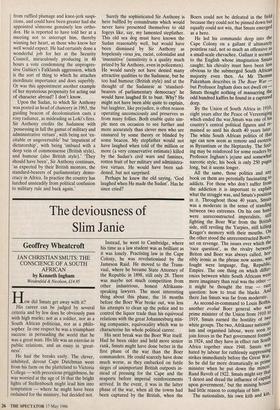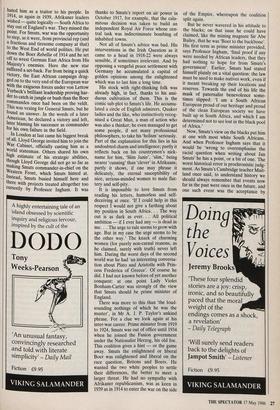The deviousness of Slim Janie
Geoffrey Wheatcroft
JAN CHRISTIAN SMUTS: THE CONSCIENCE OF A SOUTH AFRICAN by Kenneth Ingham
Weidenfeld & Nicolson, f14.95
How did Smuts get away with it?
His career can be judged by several criteria and by few does he obviously pass with high marks; not as a soldier, nor as a South African politician, nor as a philo- sopher. In one respect he was a triumphant success: in persuading the world that he was a great man. His life was an exercise in public relations, and an essay in 'great- ness'.
He had the breaks early. The clever, inhibited, devout Cape Dutchman went from his farm on the platteland to Victoria College—with precocious priggishness, he was worried at the age of 16 that the bright lights of Stellenbosch might lead him into temptation — where he might have been ordained for the ministry, but decided not. Instead, he went to Cambridge, where his time as a law student was as brilliant as it was lonely. Practising law in the Cape Colony, he was revolutionised by the Jameson Raid. He moved to the Trans- vaal, where he became State Attorney of the Republic in 1898, still only 28. There was maybe not much competition from other industrious, honest Afrikaans- speaking lawyers. The most interesting thing about this phase, the 16 months before the Boer War broke out, was less his attempts to clean up the police and to control the liquor trade than his equivocal relations with the great Johannesburg min- ing companies, equivocality which was to characterise his whole political career.
His next break was the Boer War itself. Had he been older and held more senior rank, Smuts might have done better in the first phase of the war than the Boer commanders. He could scarcely have done much worse, as they embarked on futile sieges of unimportant British outposts in- stead of pressing for the Cape and the seaports before imperial reinforcements arrived. In the event, it was in the latter phase of the war, when all the towns had been captured by the British, when the Boers could not be defeated in the field because they could not be pinned down but equally could not win, that Smuts emerged as a hero.
He led his commando deep into the Cape Colony on a gallant if ultimately pointless raid, not so much an offensive as a small-scale chevachee. Gallant it seemed to the English whose imagination Smuts caught; his chivalry must have been less obvious to the submerged South African majority even then. As Mr Thomas Pakenham describes in The Boer War — but Professor Ingham does not dwell on Smuts thought nothing of massacring the odd hundred kaffirs he found in a captured dorp. By the Union of South Africa in 1910, eight years after the Peace of Vereeniging which ended the war,Smuts was one of his country's central political figures and re- mained so until his death 40 years later. The white South African politics of that age can now seem as remote and esoteric as Byzantium or the Heptarchy. The feel- ing may be reinforced for some readers by Professor Ingham's jejune and somewhat narcotic style; his book is only 250 pages long, but it seems longer.
All the same, those politics and any book on them are perenially fascinating to addicts. For those who don't suffer from the addiction it is important to explain what the struggle was, and Smuts's position in it. Throughout those 40 years, Smuts was a moderate in the sense of standing between two extremes. On his one hand were unreconstructed imperalists, still fighting the Boer War from the British side, still reviling the Yarpies, still killing Kruger's memory with their mouths. On the other stood the unreconstructed Boers, set on revenge. The issues over which the `race question', as the rivalry between Briton and Boer was always called, hor- ribly ironic as the phrase now seems, Was fought were language, flag, Republic, Empire. The one thing on which differ- ences between white South Africans were more imaginary than real was the other -- it might be thought the true — race question: how to treat the blacks. And there Jan Smuts was far from moderate.
As second-in-command to Louis Botha, another evolues Boer general who was prime minister of the Union from 1910 to 1919, Smuts earned the hostility of two white groups. The two, Afrikaner national' ism and organised labour, were soon to join forces in the Pact government formed in 1924, and they have in effect run South Africa together since 1948. Smuts Was hated by labour for ruthlessly suppressing strikes immediately before the Great War' So he did far more dramatically as prune, minister when he put down the millers Rand Revolt of 1922. Smuts might say thati `I detest and dread the influence of capital upon government,' but the mining house' had little reason to complain of him. The nationalists, his own kith and kin' hated him as a traitor to his people. In 1914, as again in 1939, Afrikaner leaders wished — quite logically — South Africa to stay out of England's war. They missed the point. For Smuts, war was the opportunity to step, as it were, from provincial rep (and a fractious and tiresome company at that) to the West End of world politics. He put down the Boer Rebellie of 1914 and he set off to wrest German East Africa from His Majesty's enemies. Here the new star suffered a set-back. Far from being a quick victory, the East African campaign drag- ged on to the very end of the European war with the exiguous forces under von Lettow Vorbeck's brilliant leadership proving har- der to catch in jungle or bush than the Boer commandos once had been on the veldt. This was vexing for General Smuts, but he found an answer. In the words of a later American, he declared a victory and left, later blaming his successor as commander for his own failure in the field.
In London at last came his biggest break of all. Lloyd George invited him to join the War Cabinet, officially casting him as a world statesman. Others shared his own high estimate of his strategic abilities, though Lloyd George did not go so far as making Smuts commander-in-chief on the Western Front, which Smuts hinted at. Instead, Smuts busied himself here and there with projects treated altogether too cursorily by Professor Ingham. It was thanks to Smuts's report on air power in October 1917, for example, that the cala- mitous decision was taken to build an independent Royal Air Force whose cen- tral task was indiscriminate bombing of inhabited towns.
Not all of Smuts's advice was bad. His interventions in the Irish Question as it came to a head in 1918-22 were always sensible, if sometimes irrelevant. And by opposing a vengeful peace settlement with Germany he accumulated a capital of golden opinions among the enlightened which was to last him a long time.
His stock with right-thinking folk was already high, in fact, thanks to his assi- duous cultivation of them. This is the comic sub-plot to Smuts's life. He accumu- lated a circle of English admirers, Quaker ladies and the like, who instinctively recog- nised a Great Man, a man of action who was also a thinker; he even managed to get some people, if not many professional philosophers, to take his 'holism' seriously. Part of the explanation for this lies in his undoubted charm and intelligence; partly it reflects back on his countrymen's nick- name for him, 'Slim Janie', 'slim,' being nearer 'cunning' than 'clever' in Afrikaans; partly it shows, if one may phrase it delicately, the eternal susceptibility of nice, serious-minded women to male flat- tery and self-pity. It is impossible to love Smuts from reading his letters, humorless and self- deceiving at once. 'If I could help in this respect I would not give a farthing about my position in South Africa. . . The way out is as dark as ever. . . All political ambition — if I ever had any — is dead in me. . . The urge to rule seems to grow with age. But in my case the urge seems to be the other way.' The knack of charming women (for purely non-carnal reasons, as he claimed, surely with truth) never left him. During the worst days of the second world war he had 'an interesting conversa- tion about Plato and Aristotle with Prin- cess Frederica of Greece'. Of course he did. I had not known before of yet another conquest: at one point Lady Violet Bonham-Carter was strongly of the view that Smuts should be prime minister of England. There was more to this than 'the loud- sounding nothings of which he was the master', in Mr A. J. P. Taylor's unkind phrase. For a clue we look again at his inter-war career. Prime minister from 1919 to 1924, Smuts was out of office until 1934 when he joined the Fusion government under the Nationalist Herzog, his old foe.
This coalition gives a hint — or the game away. Smuts the enlightened or liberal Boer was enlightened and liberal on the race question, Britons and Boers. He wanted the two white peoples to settle their differences, the better to meet a larger threat. He had no sympathy with Afrikaner republicanism, was as keen in 1939 as in 1914 to enter the war on the side of the Empire, whereupon the coalition split again.
But he never wavered in his attitude to the blacks; on that issue he could have claimed, like the mining magnate Sir Abe Bailey, that he was 'Boer to the backbone'. His first term as prime minister provided, says Professor Ingham, 'final proof if any were needed by African leaders, that they had nothing to hope for from Smuts's government'. Earlier, Smuts had stated himself plainly on a vital question: the law must be used to make natives work, even if it meant breaking up their locations and reserves. Towards the end of his life the mask of paternalist benevolence some- times slipped: 'I am a South African European proud of our heritage and proud of the clean European society we have built up in South Africa, and which I am determined not to see lost in the black pool of Africa.'
Now, Smuts's view on the blacks put him at one with most white South Africans. And when Professor Ingham says that it would be 'wrong to overemphasise the racial question when writing about Jan Smuts' he has a point, or a bit of one. The worst historical error is prochronistic judg- - ment. As Smuts's Cambridge teacher Mait- land once said, to understand history we should always remember that events now far in the past were once in the future, and one such event was the acceptance by whites of blacks as their equals. Smuts cannot simply be condemned because he wasn't a premature Kaffir-boetie, a con- scious friend of the blacks.
Rather, it is the constant evasions on this — and then every other — subject which bred in him his terrible slipperiness. As Patrick Duncan said, any statement by Smuts had to mean 'two or three different things at once without altogether meaning any of them'. That was in the context of South African politics; a fortiori when he was writing or lecturing at Oxford.
And it is at least possible that Slim Janie's deviousness was finally his failure. After holding office again from 1939 to 1948, he was defeated by the resurgent Nationalists. He died two years later, laden with honours, the OM, the Chancellorship of Cambridge. His last years allowed him to polish again his reputation among the high-minded by denouncing Malan's gov- ernment for 'using the methods of fascism'.
But didn't he himself bear some re- sponsibility for the course of South African history, for what his country had become by 1950 and has become since? His life story is, in its way, a tragic one. And for all the extraordinary reputation Smuts enjoyed at his death, we might draw the melancholy conclusion that in the circum- stances of that lovely and luckless land, the very concept of 'a great South African' is a contradiction in terms.




















































 Previous page
Previous page